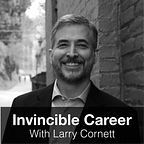
Did you know that a bad boss and toxic work environment might be worse for your health than smoking? People often joke around about how much they hate their jobs and managers. But, the stress is apparently no laughing matter.
Researchers from Harvard and Stanford conducted a meta-analysis of more than 200 studies to understand the effects of stress in the workplace. Some of their findings:
Worrying about losing your job makes you 50% more likely to experience poor health.
Having an overly demanding job makes you 35% more likely to have a physician-diagnosed illness.
People sometimes get caught up with pursuing prestigious employers. I’ve worked with clients who absolutely wanted to land a job at one of the FAANG companies. Why? Just because they are a FAANG company and they think it will look great on their resumes.
People also get hung up on job titles. They think they are willing to put up with a ton of stress and unhappiness as long as they land that big promotion.
Finally, people do chase money. They’re willing to sacrifice their personal lives, relationships, and health for significant compensation.
I say “people,” but I used to be one of those people too. I wanted a job at one of the big companies. So, I did work at Apple, and I interviewed and received a job offer from Google.
I aggressively climbed the career ladder and pursued an executive job title. I did think that more money would make my life better.
But, no job title and no amount of money can make you feel better about working for a bad manager in a toxic work environment. Eventually, the stress and anxiety catch up with you. It’s not worth it.
From research by Clarine M. Jacobs, Ph.D., published in Ineffective-Leader-Induced Occupational Stress:
Nearly 70% of employees rated work as a significant source of stress.
Almost 75% of workers rated their leader as the most significant source of stress.
Roughly 80% of workers experienced stress-related physical symptoms, including fatigue and exhaustion; irritability or anger; lack of interest, motivation, or energy; headaches; and dyspepsia.
51% of workers reported decreased productivity at work because of stress.
More than 75% of employees believe they are under more occupational stress than the previous generation was.
Ok, that’s enough scary statistics. I think you get the picture, and I’m sure you’ve experienced some of this in at least one of your jobs or with one of your past bosses.
Some stress is inevitable. Heck, even some level of stress helps you adapt and grow.
However, high levels of sustained stress are awful for you. If you’re already dealing with other issues (e.g., experiencing poor health, struggling with personal relationships), the added stress at work will push you beyond the limit of what you can manage.
So, how can you ensure that you’ll be working for a good boss when you make your next career move?
Choosing the right boss
People focus so much on choosing their next employer and job. “I want to be a senior designer either at Google or Facebook!”
However, they often accept that their manager will be who it will be. Not good. You should spend just as much time seeking and selecting your next manager as you spend researching companies and jobs.
I’ve learned that a great manager at a mediocre company will do more for your career than a terrible boss at a great company. Who your boss is will significantly impact your work satisfaction, success, and career progress.
It doesn’t matter how great a company is if your manager is terrible. Your self-confidence, health, and career growth can be ruined by a boss who tears you down, doesn’t support you, and blackballs you for the rest of your career.
One of the riskiest moves you can make is to accept a job offer with a company where you have no idea who your manager will be. Even riskier is to accept a job offer when you already know that your manager will be a problem.
Sometimes, everyone will agree that someone is a bad boss. However, some bosses are fine for some people, but their leadership and communication styles don't work for you. That’s why it’s so important to ask the right questions, do your research, and uncover red flags before you join.
I cannot emphasize enough how important it is to talk with past employees who have experience with your potential manager. That will often be your best source for reliable information and honest answers. Current employees may be afraid to tell you bad things about their boss.
Some questions to ask past employees:
Does the manager have a good reputation and healthy relationships within the company?
What kind of people work best with this manager?
Who doesn’t seem to be a good fit for this manager?
Does this manager invest in their team?
How do they make decisions?
What happens when this manager gets upset? How do they behave?
Would you work for them again? Why or why not?
Would you recommend that a friend work for this manager? Why or why not?
Some questions to ask current employees:
What do you enjoy about working here?
How do you feel about the workload and expectations?
What’s it like working for this manager? What is their management style? Communication style?
How often do you meet with the manager?
How are decisions made here?
How is conflict resolved?
What happens if you disagree with the manager?
Do you feel like they invest in you and the team? Do you feel supported?
How is success measured?
What kind of people are rewarded here? Who tends to get promoted?
How have you grown here? What does your future look like with the company?
What kind of person doesn't do well here?
Does the manager shield you from other leaders and the higher-ups?
What are the biggest issues you’re dealing with?
Would you want to follow your manager to another company? Why or why not?
Some questions to ask your potential manager:
Why is this position open?
Why did the last employee in this role leave the company?
How do you make decisions?
What do you do if an employee disagrees with you?
What would your past employees say about you?
How do you invest in your employees?
What are your expectations for me in this role?
What does success look like, and how will you measure it?
How do you prefer to communicate and share information?
How often do you like to get updates?
How often would we meet?
Red flags:
They seem to enjoy putting people in “their place.”
They don’t praise and only give negative feedback (which they may call “constructive criticism”).
They talk negatively about current employees on the team (e.g., “They’re a little lazy, so you’ll need to whip them into shape”).
They speak negatively about their peers or higher-ups.
They brag about their ruthlessness and how it helped them get ahead in their career (Believe it or not, I’ve experienced more than one leader talking like this).
They talk negatively about past employees (e.g., “The previous manager was kind of weak.”).
They cut you off when you’re speaking.
They’re very controlling of the interview flow (e.g., they don’t let you ask questions until the end).
They seem evasive when answering your questions or use defensive body language.
They don’t behave respectfully during the interview (e.g., barely listening to you while reading emails on their phones).
They make negative comments about your past experience, employers, degrees, or schools (e.g., “Literature degree? That seems kind of useless in this market.”).
They have unreasonable expectations for the role and what you can reasonably accomplish (e.g., “I want you to redesign the entire product in 5 weeks.”).
They don’t have a clear definition of success or how it will be measured.
They tell you that you should feel “lucky” if you get the chance to work there.
Strangely enough, they act way too friendly and are trying to convince you that the job and workplace are “perfect.”
Current employees act nervous or artificially “happy” (e.g., “Oh boy, I sure do love working here!!! It’s all good.”).
Past employees directly warn you about the manager or say they wouldn’t work for them again.
Employees tell you that the manager tends to use fear, threats, and intimidation to get things done.
Past employees seem afraid to answer your questions and want to make sure their name isn’t mentioned.
Choosing the right work environment
Different people thrive in different environments. There isn’t a one-size-fits-all company or employer that is best for everyone.
What type of company is the best fit for your next career move?
Do you work better in a smaller company where you know everyone or a larger company with more perks?
Do you want more potential upside with the associated risks, or do you prefer a more stable company with minimal risk?
Do you care how the company makes money (e.g., advertising vs. software subscriptions)?
Your answers to these questions can guide you to a clearer definition of your ideal employer. For example, the size of company and maturity you prefer:
Early-stage startups
Mid-stage startups
Late-stage startups
Small companies
Mid-sized companies
Larger companies
Massive corporations
Institutions (e.g., nonprofits, universities)
But, you will also need to consider the following as part of defining this ideal employer too:
Organizational structures (e.g., flatter organizations or more hierarchical)
Organizational cultures (e.g., informal vs. formal, open communication vs. more secretive, diverse vs. monoculture)
Industries (e.g., consumer hardware, enterprise software, education, construction, consumer services, fintech, pharmaceutical)
Business models (how does the employer make money?)
Red flags:
The environment is described as being fast-paced, high-pressure, competitive, or “we work hard and play hard” (i.e., prepare for cutthroat coworkers, poor work-life balance, and lots of stress).
They tell you that you’re joining a “rocket ship.”
Everyone wears “multiple hats” (i.e., you’ll have four jobs and only paid for one).
They overly emphasize the perks (e.g., lots of free food!).
They lowball your compensation, talk about “earning potential,” and promise you that you’re going to get rich from the equity.
Employees are supposed to feel like “family.”
The culture is a monoculture (e.g., mostly MBAs from Stanford).
The business model doesn’t seem viable or sustainable.
You don’t like how the company makes money (e.g., ads).
Be intentional
Finding your next job goes way beyond choosing a role and employer. Unfortunately, great compensation, a fancy job title, and a prestigious company aren’t enough to ensure your success and happiness.
You can thrive in a great company culture or feel miserable every day in a toxic one. Likewise, you can watch your career success and personal fulfillment soar under a great leader or have your hopes dashed working for a terrible manager.
Be very intentional when you choose your next boss. Your success, health, and well-being depend on it!
Would you like more helpful advice and support as you are researching your next career move?
We’re only a click away when you subscribe, and I add you to my premium community and private office hours channel. Hope to see you there!
⬆️ Scroll to the top if you want to listen to my expanded discussion of this topic! 🎧
Want to join my career community?
If you’d like to be a part of my private community of ambitious professionals who want to be more successful in their careers, simply subscribe now, and I’ll send you an invitation. After four years, it’s no longer open to the general public. Once you’re in, you’ll be able to participate in our exclusive office hours every week!
Are you ready to turn a $15/month investment into thousands of dollars of increased income every year? That’s exactly what has happened for many members of my community.
However, I do know that not everyone is ready to become a paid subscriber yet. But, there is a great way you can support my work without spending any money:
📣 Recommending my newsletter on social media 📣
It only takes a few seconds, and it helps grow my business so I can continue making time to write it.
I'll even provide some copy and paste text to make it easy to share on Twitter, Reddit, LinkedIn, Facebook, etc. Thanks in advance!
I've really been enjoying the Invincible Career newsletter by Larry Cornett (@cornett). If you want to get ahead in your job and you aren’t subscribed yet, you’re missing out.
https://newsletter.invinciblecareer.com/
This week’s office hours topic
Larry Cornett is a leadership coach and business advisor who also hosts a private mastermind community for solopreneurs and entrepreneurs who want more accountability and support. If you’re not interested in starting your own business someday (or accelerating an existing one), this community isn’t for you.
Larry lives in Northern California near Lake Tahoe with his wife and children, and a gigantic Great Dane. He does his best to share advice to help others take full control of their work and life. He’s also on Twitter @cornett.












